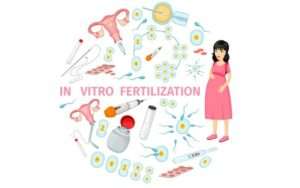Understanding the Causes of Female Infertility: Why Some Women Struggle to Get Pregnant

Infertility can be a deeply emotional and challenging experience for women and couples hoping to conceive. Female infertility affects millions of women worldwide, with many struggling to understand why pregnancy seems elusive. Understanding the underlying causes of female infertility is a crucial step in addressing the issue and seeking effective treatments. In this article, we’ll explore the common causes of female infertility, how it is diagnosed, and potential treatment options.
What is Female Infertility?
Female infertility is defined as the inability to conceive after one year of unprotected intercourse for women under the age of 35, or six months for women over 35. According to the World Health Organization (WHO), infertility affects an estimated 48 million couples globally. Among these cases, approximately 30% are due to female infertility, with another 30% attributed to male infertility, and the remaining cases being unexplained or a combination of both male and female factors.
The inability to conceive can take an emotional toll on women, leading to feelings of frustration, sadness, and anxiety. Many women are unaware that the cause of infertility can often be pinpointed, and once diagnosed, targeted treatments are available. Understanding the causes of female infertility can offer insight into why some women struggle to get pregnant and open doors to potential solutions.
Key Causes of Female Infertility
Female infertility can be caused by a variety of factors, some of which are more common than others. Let’s break down the most prevalent causes of infertility in women:

1. Ovulatory Disorders
Ovulatory disorders are one of the most common causes of female infertility, affecting up to 25% of all infertility cases. These disorders occur when a woman’s ovaries either fail to release eggs (anovulation) or release eggs irregularly (oligovulation). Conditions such as Polycystic Ovary Syndrome (PCOS) and hormonal imbalances are common culprits.
PCOS is one of the leading causes of ovulatory disorders, affecting up to 10% of women of reproductive age. It is characterized by irregular periods, excessive androgen (male hormone) levels, and polycystic ovaries. Women with PCOS may have difficulty ovulating regularly, making conception challenging.
Other hormonal imbalances, such as thyroid dysfunction or elevated prolactin levels, can also disrupt ovulation. Fortunately, many ovulatory disorders can be managed with lifestyle changes, medications like Clomiphene citrate, or fertility treatments like in vitro fertilization (IVF).
2. Fallopian Tube Blockage or Damage
The fallopian tubes play a critical role in conception, as they are the pathway through which the egg travels from the ovaries to meet the sperm. If the fallopian tubes are blocked or damaged, the sperm and egg may not be able to meet, resulting in infertility.
Common causes of fallopian tube damage or blockage include pelvic inflammatory disease (PID), sexually transmitted infections (STIs) like chlamydia or gonorrhea, and previous abdominal surgeries. According to research, up to 25% of female infertility cases are due to tubal blockages or damage.
Laparoscopic surgery may be required to diagnose and potentially repair damaged fallopian tubes. In cases where surgery is not possible, IVF can offer a solution by bypassing the fallopian tubes altogether.
3. Endometriosis
Endometriosis is a condition in which tissue similar to the lining of the uterus (endometrium) grows outside the uterus, often affecting the ovaries, fallopian tubes, and pelvic cavity. This tissue can cause inflammation, scarring, and adhesions that impair fertility.
It is estimated that up to 50% of women with endometriosis experience infertility. The severity of the condition often correlates with fertility challenges. Endometriosis can cause a range of symptoms, including painful periods, pelvic pain, and irregular bleeding, but it can also be asymptomatic in some women, making diagnosis difficult.
Surgical removal of endometrial tissue can improve fertility outcomes, and assisted reproductive technologies like IVF may also be effective for women with endometriosis-related infertility.
4. Uterine or Cervical Issues
Problems with the uterus or cervix can also contribute to infertility. Uterine fibroids—noncancerous growths in the uterus—are common in women of reproductive age and can interfere with embryo implantation. Polyps, which are growths in the lining of the uterus, can also hinder conception.
Structural abnormalities, such as a septate uterus (a congenital malformation of the uterus) or scar tissue from previous surgeries, can also make it difficult for a fertilized egg to implant and grow. Additionally, cervical mucus abnormalities or cervical stenosis (narrowing of the cervix) can impede sperm from reaching the egg.
In cases of uterine or cervical issues, treatments like surgery to remove fibroids or polyps may be recommended, depending on the severity of the condition.
5. Age and Declining Egg Quality
A woman’s age plays a significant role in her fertility. As women age, both the number and quality of their eggs decline, which can make it more difficult to conceive. Women are born with all the eggs they will ever have, and by the time they reach their late 30s, the quantity and quality of these eggs decrease significantly.
According to the American Society for Reproductive Medicine (ASRM), a woman’s fertility begins to decline in her early 30s, with a more rapid decline after age 35. By age 40, the chance of natural conception drops to less than 5% per cycle.
Egg freezing, IVF, and donor eggs are options that can help women facing age-related infertility.
6. Lifestyle Factors
Several lifestyle factors can negatively impact a woman’s fertility, including obesity, smoking, excessive alcohol consumption, and stress. Obesity, for example, can disrupt hormone levels and ovulation, while smoking is known to accelerate egg loss and damage reproductive organs.
According to research, women who smoke are twice as likely to experience infertility as non-smokers. Similarly, alcohol consumption and chronic stress can affect hormonal balance and overall reproductive health.
Maintaining a healthy weight, avoiding smoking, limiting alcohol, and managing stress through relaxation techniques or therapy can improve fertility outcomes for women.

Diagnosis and Treatment of Female Infertility
Diagnosing female infertility typically involves a combination of medical history, physical examination, and specialized tests. Common diagnostic tools include blood tests to measure hormone levels, ultrasound to check for abnormalities in the reproductive organs, and hysterosalpingography (HSG) to evaluate the fallopian tubes.
Once a cause is identified, treatment options can be tailored to the individual’s needs. Medications like Clomiphene citrate or gonadotropins can help stimulate ovulation in women with ovulatory disorders. In cases of tubal blockage or endometriosis, surgery may be required to restore fertility. For many women, assisted reproductive technologies (ART), such as intrauterine insemination (IUI) or IVF, can offer a solution when other treatments have failed.
Mom & More Clinic, Dr. Yasmin Imdad and her team offer comprehensive fertility assessments and personalized treatment plans based on each patient’s unique circumstances, helping women achieve their dream of motherhood.
When to Seek Help from a Fertility Specialist
If you’ve been trying to conceive without success for over a year (or six months if you’re over 35), it may be time to seek advice from a fertility specialist. Women with known reproductive issues, irregular cycles, or a history of pelvic infections should seek help even sooner. Early intervention can improve your chances of a successful pregnancy.
Dr. Yasmin Imdad and the team at Mom & More Clinic are dedicated to supporting women on their fertility journey by providing advanced diagnostics, compassionate care, and the latest fertility treatments.
Conclusion
Female infertility can have a wide range of causes, from hormonal imbalances to structural issues in the reproductive organs. Understanding the underlying cause is essential for finding the right treatment. With the right support and medical care, many women struggling with infertility can go on to have successful pregnancies.
Whether you’re facing ovulatory issues, endometriosis, or age-related fertility challenges, modern medicine offers a variety of options to help women overcome infertility.